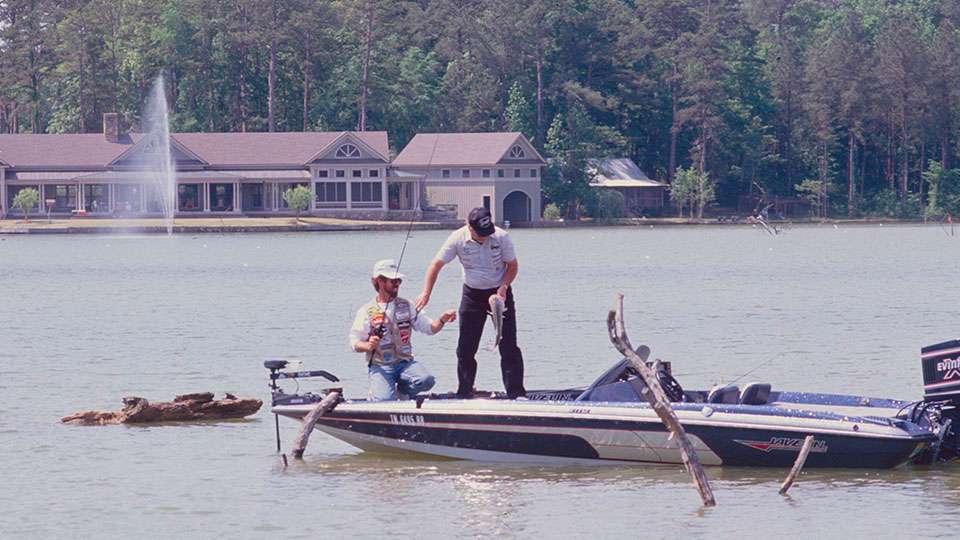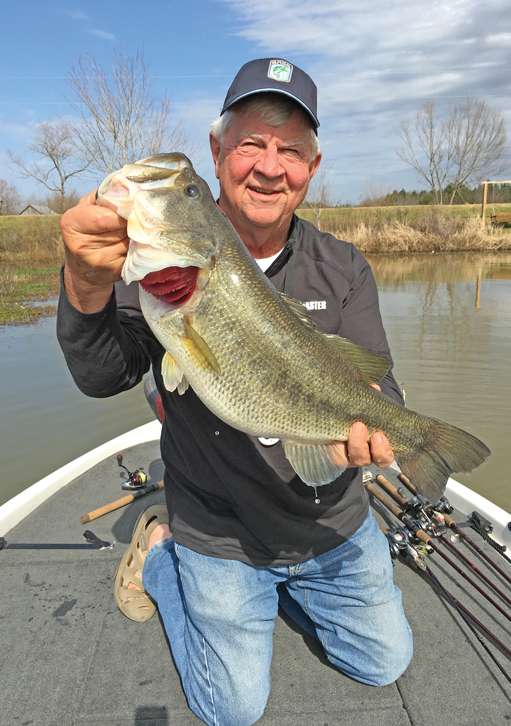
When I learned this week that Ray Scott has sold his storied farm near Pintlala, Ala., the news brought back a flood of memories.
Soon after his Bass Anglers Sportsman Society — now simply B.A.S.S. — began to take off, Scott bought a large parcel of land just 20-minutes south of Montgomery. Anyone else would have been sold merely on the 16-acre lake off historic Federal Road that was teeming with bass.
Scott, however, had a grander vision of how he would use the property.
A few years after I joined the young B.A.S.S. operation, Scott hosted a company picnic on his property. While employees and their kids were playing games, eating and fishing the lake, he invited my wife, Linda, and me on a tour of the property. We climbed into his SUV, and he drove across the rolling hills as he revealed his vision for the land.
“I’ll build my big lake there,” he said, as he pointed to a low place in a field between stands of oaks and pines. “My house will be on that point, facing the main lake and the dam.” As he dreamed out loud, I could almost see the water filling the valleys and sloughs, and imagine the bass he would place there.

In 1986, his vision was realized, and Scott and his wife, Susan, moved into the stately home on his lake. At about that time, he sold B.A.S.S. to Helen Sevier, his executive vice president, and some investors, and he began turning his attention to deer hunting. He founded The Whitetail Institute and began selling his 30-06 Imperial Whitetail Clover, a seed that now covers millions of acres of deer food plots. He built a high fence enclosure to contain some Canada-strain whitetails, which tend to grow much bigger than Alabama deer.
However, he didn’t forget his passion for bass — especially growing big bass.
Legend has it that he got caught smuggling Florida-strain bass out of Florida to stock in his lake. The fish were confiscated and he was slapped on the wrist, but eventually he convinced authorities that his lake was an experimental operation intended for studying the black bass. Scott said he was provided another batch of brood stock, and those fish soon felt right at home in his 55-acre lake.
I was fortunate to spend many hours researching bass behavior at the “scientific facility,” catching offspring of those Florida transplants. One cold February morning I fished the lake with Scott; Harold Sharp, his former tournament director; and Don Butler, the first member of B.A.S.S. and winner of the second Bassmaster Classic.
Every member of that foursome caught a 10-pounder that day — except me. Instead of a trophy bass, though, I have a trophy memory of spending a day on the water with three icons of the sport. Sharp and Butler have passed on, but I’ll always cherish that and other times I spent with those men.
Other celebrities fished the lake, as well. Bass fishing legend and four-time Bassmaster Classic champion Rick Clunn caught his personal best on the lake – a 13-pound, 15-ounce lunker.
Scott got the idea to hold fund raising tournaments for his church, Pintlala Baptist. He invited B.A.S.S. pros, fishing industry leaders and other potential donors to fish the lake along with his friend, President George H.W. Bush.

I drove the photo boat for the president’s photographer in one of those events, watching as Bush held his own even though he was being front-ended by B.A.S.S. pros Guy Eaker and Charlie Ingram.
Bush loved the lake, and he and his wife, Barbara, and son, George W., were guests from time to time. Scott soon took to calling it the Presidents Lake.
He continued to enhance the 200-acre estate, building two more lakes — one stocked with nothing but big female bass — and honing his skills as a designer of bass lakes. (In fact, I now live in a subdivision near Birmingham containing several small lakes “designed” by Scott.)
Scott was generous to let me fish his lakes and occasionally take friends and family members there. When my youngest son, Joseph, was 8 or 9 years old, the B.A.S.S. founder invited us to a fishing weekend at his nearby Bridge Creek retreat. (You know you’ve arrived when you have a fishing getaway in addition to a world-class fishery like Presidents Lake!)

Joseph would later brag to friends and anyone else who would listen, “I caught 43 fish in one day!”
The lake played a role in some of Scott’s crusades, including one to get everybody fishing nothing heavier than 4-pound-test line. He even had a tournament or two on the lake, challenging some of the top pros of the day to catch the biggest fish they could on ultralight gear.
Of course they lost some giant bass in those derbies, but Scott persisted in the cause, even trying to convince B.A.S.S. tournament officials to conduct a professional event in which nothing heavier than 4-pound line could be used.
Not coincidentally, Scott had developed a line of ultralight rods meant for fishing spider web-thin mono. Called Ray Scott Tackle rods, they were actually good light-action sticks. I use mine to this day. He likened the light-line challenge to bowhunting for deer, and he proved it could be done by landing an 8-pounder from his lake on the gear.
In recent years, Scott began offering trips to his “Ray Scott’s Trophy Bass Retreat,” which included fishing on his lake, accommodations and food — all targeted toward corporate leaders who could justify (and afford) the expense for business purposes.
Last year, he decided to sell his land, lakes and lake houses, and this month he found a buyer — attorney Andy Birchfield of Montgomery. Asking price was $3.4 million. Selling price has not been disclosed.
Scott’s Realtor, Jerry Joe Ingram of National Land Realty, said it was an honor to work with Scott on the sale.
“It didn’t take me long to recognize what he had put into the estate,” Ingram said. “As an outdoorsman, I really appreciated Mr. Scott’s philosophy about the land and its resources. He believes the land is only on loan to us, and in being good stewards now we can ensure our resources not only for ourselves but for future generations as well.”
Scott acknowledged that leaving the property is difficult. “But I won’t be far away,” he added. “I’ll be across the hill on a secluded side of the property in a small cottage on an old 16-acre lake. It’s perfect for me and my wife and our two dogs. Plus, I think I’ve gained an outstanding neighbor, and if he wants, I’ll show him a few honey holes.”
But Birchfield and other visitors should be wary. Almost 40 years ago, when Scott learned that folks living nearby had begun fishing the lake uninvited, he let it be known that he had stocked the lake with alligators.
That immediately cut down on the poaching. And there’s no telling how big those ’gators are now.
See more photos of Ray Scott’s property here.

